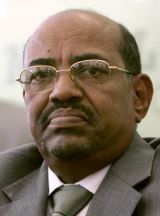Sudan dismisses Annan criticism, blames rebels
Dec 8, 2006 (KHARTOUM) — Sudanese President Omar Hassan al-Bashir dismissed criticism by the U.N. secretary-general on Friday, saying the U.N. was making unreasonable demands and turning a blind eye to the activities of Darfur rebels.
 U.N. Secretary-General Kofi Annan said on Thursday the Sudanese government might have to answer “individually and collectively” for failing to protect the people of the troubled western region from killings, rape and destruction.
U.N. Secretary-General Kofi Annan said on Thursday the Sudanese government might have to answer “individually and collectively” for failing to protect the people of the troubled western region from killings, rape and destruction.
Annan has been trying without success to persuade Bashir to accept a “hybrid” U.N.-African Union peace force in Darfur, where tens of thousands of people have been killed and 2.5 million people driven from their homes since early 2003.
But Bashir told a news conference in Khartoum on Friday that the rebel National Redemption Front (NRF) was responsible for the recent trouble in Darfur, which has worsened despite a partial peace agreement signed in Nigeria in May.
“If there are any problems in Darfur, it is because of the activities of the National Redemption Front, which was formed after the Abuja agreement,” Bashir said.
The front brings together Darfur rebel groups which rejected the agreement, signed in the Nigerian capital, Abuja, by the government and only one major rebel faction.
“This force was formed with obvious encouragement from the international community, because it was agreed that whoever won’t sign the peace agreement and tries to disrupt peace in Darfur will be punished,” Bashir said.
“This group is receiving huge support in terms of weapons, equipment and vehicles through the border and this has not been condemned (by the United Nations and others),” he added, referring to the border between Darfur and neighbouring Chad.
“COLONIAL POWERS”
“How come we are prevented from standing against the Redemption Front and at the same time called upon to protect the citizens from them?” Bashir said.
Annan told reporters in New York the Sudanese government had a responsibility to protect its citizens and had clearly failed to do so.
“In time, they may have to answer collectively and individually for what is happening in Darfur,” Annan said. “I think we should be clear where the failure lies.”
Bashir has rejected the U.N. proposal of a hybrid force, just as he rejected previously the idea of a wholly U.N. force, saying colonial powers want to reassert control of Sudan.
He feels in a relatively strong position because the United Nations is unlikely to deploy a force in Darfur without the consent of the Sudanese government, diplomats say.
The United States, one of the main supporters of military intervention in Darfur, is sending its special envoy to Sudan this week in another attempt to persuade the Sudanese government to change its mind.
U.S. envoy Andrew Natsios will arrive in Sudan on Saturday and will visit Khartoum, Darfur and southern Sudan before travelling to Chad on Thursday, said a U.S. official, who spoke on condition he not be identified.
The African Union already has about 7,000 troops in the vast desert region of Darfur but its force is widely viewed as lacking the funds, manpower and equipment to maintain security.
The conflict began when the rebels, mainly from non-Arab farming communities, took up arms to prise more power from the central government in Khartoum.
The government responded by recruiting auxiliary militia forces from among mainly Arab nomadic communities. Some of the militias have attacked and displaced peaceful villagers.
(Reuters)
